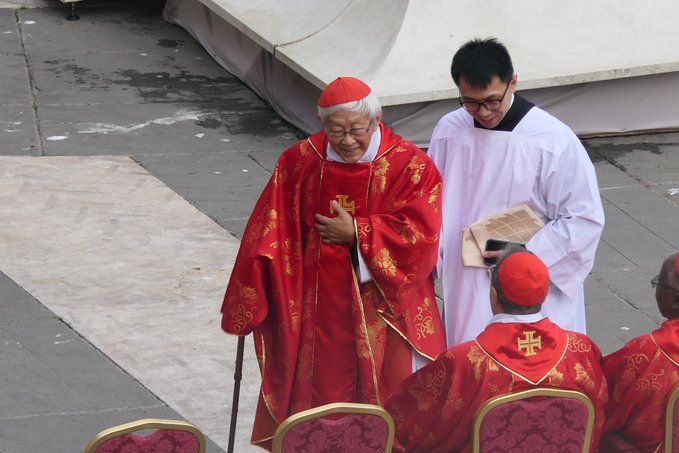
Krakow, Poland, Apr 3, 2018 / 10:04 am (CNA/EWTN News).- Thirteen years after the death of St. John Paul II, a close friend and colleague of the beloved Polish pope said the pontiff's vast legacy and influence can still be felt, and is a source of inspiration for the world.
“Thirteen years have passed since the death of this Holy Shepherd, yet he unceasingly continues to speak, inspiring, showing the way, and encouraging,” said Cardinal Stanislaw Dziwisz April 2.
In looking at the “book of life” for John Paul, Dziwisz said it is clear that the Polish pope's life and ministry were a reflection of Jesus Christ, and were built on the “rock” of his personal relationship with God.
Dziwisz, archbishop emeritus of Krakow, was a close friend of Pope Saint John Paul II and served as his personal secretary for 40 years – both in Poland before the pontiff was elected to the papacy, and afterward for the entirety of his pontificate.
Cardinal Dziwisz spoke during a special Mass inside the Sanctuary of St. John Paul II in Krakow commemorating the 13th anniversary of the John Paul II's death April 2, 2005.
In his homily, the cardinal said that John Paul II’s attitude throughout his life was one of “respect and readiness for service.”
This was demonstrated particularly in John Paul's attention to the pastoral care of the faithful, from the family, to youth, the unborn, the sick, disabled and elderly, he said: John Paul II “was convinced that man is the way of the Church and that this is why he constantly urged the Church to serve man.”
Dziwisz also pointed to John Paul II's influence in the wider, international community, and specifically his role in helping bring down communism in Europe during the 1980s.
John Paul, Dziwisz said, “was a realist. He saw good and evil in the world. He saw selfishness, tensions, and conflicts,” and tried to reach everyone, “especially those responsible for the fate of nations but not always guided by the same values and motivations as he was.”
The Polish pope was not only able to bring together leaders from the world's different religions to pray for and promote peace, but he “contributed in a decisive way to freeing the Central and Eastern European nations from the shackles of a totalitarian system.”
Karol Jozef Wojtyla, who would later choose the name John Paul II upon his election to the papacy, was born the youngest of three children in the Polish town of Wadowice, a small city 50 kilometers from Krakow, on May 18, 1920.
In 1942, at the height of World War II, he began courses in the clandestine seminary of Krakow, and was eventually ordained in 1946. He took part in Vatican Council II (1962-1965), being appointed archbishop of Krakow in 1964, and contributed to drafting the Constitution Gaudium et spes.
Wojtyla was elected pope Oct. 16, 1978, at the age of 58, and took the papal name John Paul II. Over the course of his 27 year pontificate – one of the longest in Church history – he traveled to 129 countries, and was instrumental in the fall of Communism in Europe.
He died at 9:37 p.m. April 2, 2005, the day before Divine Mercy Sunday – a feast he established during his pontificate – after a long battle with Parkinson's disease.
John Paul II was beatified by Pope Benedict XVI on May 1, 2011, Divine Mercy Sunday, at a ceremony which saw an estimated 2 million pilgrims flock to Rome. He was canonized April 27, 2014, in Saint Peter's Square by Pope Francis on the same feast day.
In his homily commemorating the anniversary of John Paul II's death, Cardinal Dziwisz said he had a great love for the Church, with all of her strengths and weaknesses.
The Church John Paul II loved, he said, was not “an ideal Church that does not exist,” but was rather “the Church of weak and sinful people, people who are converting, returning to the paths indicated in the Gospel.”
“John Paul II wisely and patiently guided the great community of a very diversified Church which speaks different languages and expresses the faith in different cultural contexts and traditions,” he said, adding that “there was a place for everyone in his pastoral heart.”
In leading the Church into the third millennium of the Christian faith, John Paul encouraged Christians to “look at the face of Jesus Christ, the only Savior of the world, and to go out into the depths of faith, hope, and love, and so become a leaven of good in our turbulent world.”
Dziwisz closed his homily calling John Paul II a gift to the Church and to the world, and prayed that everyone would be inspired “by the desire that he realized to the very end: to make a gift of himself to others and ultimately to God.”
If you value the news and views Catholic World Report provides, please consider donating to support our efforts. Your contribution will help us continue to make CWR available to all readers worldwide for free, without a subscription. Thank you for your generosity!
Click here for more information on donating to CWR. Click here to sign up for our newsletter.





Leave a Reply